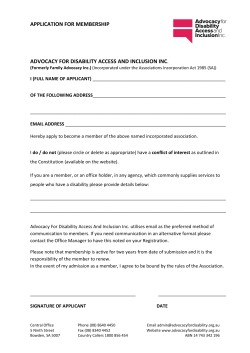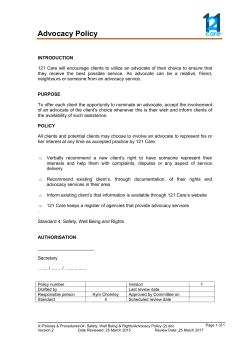
Clicking this link - California Downtown Association
SB 608 RIGHT TO REST ACT OF 2015 SENATOR CAROL LIU, 25TH DISTRICT Introduced February 27, 2015 THE PROBLEM California has no unified state law defining standard protections for basic civil and human rights guaranteeing that a most basic human necessity, resting, is protected for all residents, regardless of their housing status. BACKGROUND Throughout history, municipalities have used discriminatory laws to keep people designated as “undesirable” out of public spaces and the public consciousness. With poverty and homelessness reaching record numbers in California, there has been a documented surge of such laws, targeting people without homes but also impacting people who are poor. These laws have also been used to criminalize acts of civil disobedience at a moment in history when such actions have been necessary to raise awareness about economic inequalities and the structural racism in our criminal justice system. Enforcement of Anti-Homeless Laws in the Golden State.” Researchers identified over 500 municipal laws criminalizing standing, sitting, resting, sleeping and sharing of food in public places as well as laws making it illegal to ask for money, nearly nine laws per city, on average. The study also found that the number of ordinances targeting those behaviors rose along with the rise in homelessness following the sharp decline of federal funding for affordable housing was cut in the early 1980s and again with the Great Recession in 2008. Since 2000, statewide arrests for vagrancy offenses increased by 77 percent, the study showed. San Francisco alone issued over 3,000 citations per year from 2007 to 2013 for violations of codes outlawing sleeping, standing, sitting, resting and begging in public. In Sacramento, citations for violating an anti-camping code within city limits rose from fewer than 50 in 2010 to nearly 1,200 in 2012, the study said. SOLUTION Just like the discriminatory laws from the past, these laws deny people their right to merely exist in public. According to surveys of people who are homeless conducted by the Western Region Advocacy Project, the predominant “illegal offenses” that they have been charged with include sleeping, resting and sharing food. These surveys also revealed that the majority of people without homes do not know of a safe place to sleep at night where they would not be arrested. Researchers from the Policy Advocacy Clinic at the University of California at Berkeley Law School analyzed the prevalence of these types of municipal codes restricting rest and sharing of food in 58 California cities for its report “California’s New Vagrancy Laws: The Growing Enactment and SB 608 seeks to end the criminalization of the noncriminal activities by protecting freedom of movement, sitting, standing, lying and sleeping and clarifying that people shall have the right to share food and practice religion in public in California. SUPPORT East Bay Community Law Center (Co-Sponsor) JERICHO: A Voice for Justice (Co-Sponsor) Western Center on Law and Poverty (Co-Sponsor) Western Regional Advocacy Project (Co-Sponsor) Venice Community Housing Corporation; Homeless Action Center; Safe Ground Sacramento; Foothill House of Hospitality; St. Mary’s Center OPPOSITION None on file Senator Carol Liu Fact Sheet Contact: Joyce Roys-Aguilera (joyce.roys-aguilera@sen.ca.gov) Page 1
© Copyright 2025










